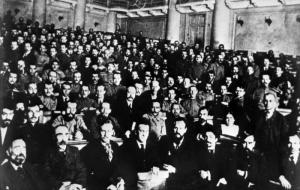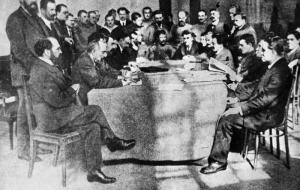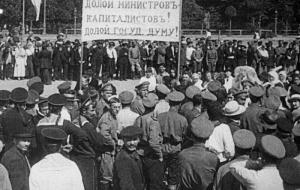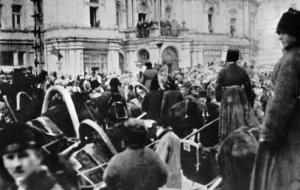June: Russians exhibit increasingly Bolshevist leanings, as Coalition shows signs of failure
Bolshevism continues to gain important ground. Not only has the number of men and women now pursuing Vladimir Lenin’s agenda grown to 240,000, but Kerensky’s “war until a decisive victory” strategy further erodes popular trust in the Provisional Government. Guchkov and Milyukov are out of the picture, but the new Coalition Government – born out of Kerensky’s plan to unite warring political factions – is a touch too late. Peasants are rising up across the country to reclaim the lands they believe to be rightfully theirs.
With media censorship also out of the way, the Pravda newspaper shows itself to be a formidable vehicle for Bolshevist writings, particularly Lenin’s own essays. The RSDLP issues 85,000 copies daily. Its sister paper – the Soldatskaya Pravda (Soldiers’ Truth) – numbers 75,000.
The country is well on its way towards a third social, political and economic slump, which will become known as the July Crisis.
What happens in June lays further groundwork for the events of October. Industries continue to require rescue, the land redistribution issue has not progressed – and a rationing system for bread is now in place. At the all-Russian Conference of the Soviets (June 16-July 7), Vladimir Lenin issues scathing criticism of the Cadet-Mensheviks, who enjoy a legislative majority. He blames them for “drowning in desperately unsolvable contradictions.” The Menshevik Tsereteli proclaims that there are no parties currently willing, or able, to take power. Apparently, no one expected Lenin to rise up from his seat abruptly and yell out – “yes, there are!” Once on stage, he added: “Every passing minute, it [the party] stands ready to assume complete control.” Still, with the election of a Central Executive Committee, the Bolsheviks secure only 10 percent of the seats. However, Lenin’s words send shockwaves throughout the population.
On the front lines, support for War Minister Alexander Kerensky begins to dwindle. The soldiers are beginning to grasp the deceptive nature of his military posturing.

June 8, 1917
The Executive Committee of the Petrograd Soviet refuses a German proposal for an unlimited armistice. The Provisional Government decides to get onboard, and publishes its own response. It carries a similar tone, comparing the prospect of backing down to "treachery."

June 15, 1917
German war planes carry out a bombing of Russian ships in the port of Riga.
--
The United States enacts the Espionage Act. This allows the government to monitor and censor publications sent by mail. It also makes it a crime to interfere with the draft and to aid enemy nations in any way.
June 16, 1917
The 1st All-Russian Workers and Soldiers Conference starts. More than 1,000 delegates take part, 822 of whom have voting rights. The conference is where Vladimir Lenin will make his famous proclamation of Bolshevik readiness to take full control of government – a speech regarded by many as among the key turning points in the public perception of the party.
This is despite literally every other party – from the Constitutional Democrats to the Mensheviks – outnumbering the Bolsheviks’ 105 delegates by a factor of more than 2 to 1.

June 23, 1917
The earlier-created Kiev Rada (Parliament) had by June been denied its request for territorial and national autonomy for Ukraine. On June 23, it goes ahead and proclaims independence anyway.

June 29, 1917
The Provisional Government would not accept the unilateral proclamation of Ukrainian independence by the Kiev Rada. Instead, it called on Ukrainians to better organize local self-governance through a system of zemstvos and city halls. As for Ukraine as a whole, the text of the Provisional Government’s official letter held that its aspirations should be raised by Ukrainian representatives inside the All-Russian Legislative Committee. The letter issued by the Russians, however, omitted several key requests leveled earlier by the Kiev Rada – one concerned the Ukrainian request for a separate Ukrainian legislative committee. This and other omissions angered Kiev, which only led to the strengthening of nationalist tendencies and aspirations there.
-
1 June
-
8 June
-
15 June
-
16 June
-
23 June
-
29 June